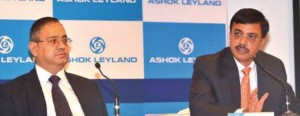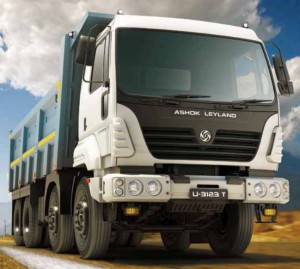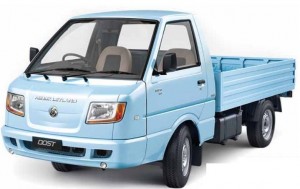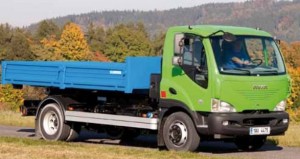Excellent overall performance during 2011-12
 Ashok Leyland registered a sales turnover of Rs. 12,841.99 crores during 2011-12, representing a rise of 14.9 per cent as compared to Rs. 11,177.11 crores in the previous fiscal. Though the net profit was down by 10.3 per cent at Rs. 565.98 crores (Rs. 631.30 crores), the company maintained its successful run of finishing with a good profit at the end of the fiscal. It continues to strive towards realising its vision of becoming one among the top 10 medium and heavy commercial truck manufacturers and break into the league of top five bus manufacturers in the world.
Ashok Leyland registered a sales turnover of Rs. 12,841.99 crores during 2011-12, representing a rise of 14.9 per cent as compared to Rs. 11,177.11 crores in the previous fiscal. Though the net profit was down by 10.3 per cent at Rs. 565.98 crores (Rs. 631.30 crores), the company maintained its successful run of finishing with a good profit at the end of the fiscal. It continues to strive towards realising its vision of becoming one among the top 10 medium and heavy commercial truck manufacturers and break into the league of top five bus manufacturers in the world.
The highlights of the company’s performance during the year were the achievement of the highest overall sales of 101,990 vehicles, a new high in international operations of 12,852 units, reflecting a rise of 25 per cent from the previous year, and the instant success of DOST, its new entrant in the LCV segment in the six markets where it was launched.
 Addressing the media, Mr. Vinod K. Dasari, Managing Director, Ashok Leyland, said: “FY 2011-12 for us saw quite a few triumphs. Our sales and production numbers reached all-time highs. The initial market feedback for DOST was overwhelming. We climbed a new peak in international operations both in terms of volumes and new markets tapped. Our ramp-up of the Pant Nagar plant was robust and complete, and, to top it all, we were able to sharpen our focus on our customers by significantly expanding the network.”
Addressing the media, Mr. Vinod K. Dasari, Managing Director, Ashok Leyland, said: “FY 2011-12 for us saw quite a few triumphs. Our sales and production numbers reached all-time highs. The initial market feedback for DOST was overwhelming. We climbed a new peak in international operations both in terms of volumes and new markets tapped. Our ramp-up of the Pant Nagar plant was robust and complete, and, to top it all, we were able to sharpen our focus on our customers by significantly expanding the network.”
Ashok Leyland has five foundation initiatives, namely, quality, people, brand, innovation and efficiency. Each of its employees is linked to one of the five.
During the year, the company produced a total of 95,559 M&HCVs and 7,760 LCVs, an all-time high. The M&HCV vehicle network expanded by 15 per cent with currently over 400 full-service outlets. The company exported vehicles to CIS countries and Sub-Saharan Africa, apart from its traditional SAARC market, outside which the export growth was an impressive 69 per cent. It also successfully collaborated with body-builders in countries such as Vietnam, Singapore, Turkey, Ukraine, Egypt and Peru, to build buses on its chassis.
 The DOST continues to be popular with an expanding dealer network, and with a 29 per cent share in the six markets in which it has been launched and a national market share of 17 per cent. The company currently produces 100 vehicles per day which is likely to be stepped up to 150.
The DOST continues to be popular with an expanding dealer network, and with a 29 per cent share in the six markets in which it has been launched and a national market share of 17 per cent. The company currently produces 100 vehicles per day which is likely to be stepped up to 150.
Another big step forward in the LCV project is the acquisition of a 380-acre land at Pillaipakkam, near Chennai, for a green-field facility to cater to the overwhelming demands of the LCV segment. An investment of around Rs. 4,000 crores has been earmarked for the LCV project and also for an expansion in the M&HCV segments.
The company’s efforts to protect its bottomline through its focus on non-cyclical or support businesses yielded rich dividends, with Leyparts, the spare parts business, growing by 20 per cent and both the Defence and power solutions businesses holding their own. Ashok Leyland Defence has sold over 60,000 stallion vehicles to the Indian army and also exports them to Honduras, Africa and the US Army in Iraq.
Pant Nagar facility
 Ashok Leyland’s Pant Nagar plant which has been ramped up to full capacity rolled out 4,001 vehicles in March 2012. The company is proud that the facility is one of the most integrated commercial vehicle plants in the world, with forgings, castings and sheet-metal fed on one side and a full-built truck rolling out on the other. The company is doubling the frame capacity, adding a new press shop and two new weld lines – one for Avia trucks and the other for the new cab which will replace the U-truck cab over the next two years.
Ashok Leyland’s Pant Nagar plant which has been ramped up to full capacity rolled out 4,001 vehicles in March 2012. The company is proud that the facility is one of the most integrated commercial vehicle plants in the world, with forgings, castings and sheet-metal fed on one side and a full-built truck rolling out on the other. The company is doubling the frame capacity, adding a new press shop and two new weld lines – one for Avia trucks and the other for the new cab which will replace the U-truck cab over the next two years.
Ashok Leyland has also planted over 40,000 trees at Pant Nagar as part of its CSR drive. This offers a unique opportunity for the locals to learn and work at the same time through the ‘blessing scheme’ and also has a state-of-the-art learning centre near the plant. With 20 to 25 per cent of the employees there being female, the company has set up the country’s first on-site girls’ hostel, with three more modules of the same coming up in the plant.
With multi-axle vehicles accounting for half the market-size in the country, Ashok Leyland, enjoying 65 per cent of the specific market in the South, was tested when the south market fell by 17 per cent. The 4×2 haulage segment in the South, in which it had 70 per cent share, dropped by 15 per cent. Finally the company’s weakest segment, the ICV goods carrier where it has less than 10 per cent share, surprisingly grew by 25 per cent.
Commenting on the challenges on the domestic front, Mr. Dasari said that more could have been achieved. “We were hit from many sides. Our strongest market – South – was depressed. Also, segments like ICV in which we are not too strong grew substantially. However, we have rebounded. We gained market share in March ’12 and continued the good showing in April and hope to keep up this momentum”.
Although the company increased its market share in the central region for the first time and in the Tipper and ICV segments, growth in other segments was muted.
Avia Ashok Leyland in Prague, the company’s Czech wing, doubled its sales in 2011 from the previous year and currently exports vehicles to the US with CIS and Middle East being potential targets. Ashok Leyland’s Ras-al-Khaimah facility which was set up two years ago has reached its full capacity of four buses per day. The company had completed acquisition of Optare, after it had raised its stake to 75.1 per cent in the UK company. The acquisition gave Ashok Leyland access to Optare’s plant at Leeds, capable of making 40 to 50 buses per month.
The U-Truck range has been a big success in the market with the 4923, 2523 and 3123 performing extremely well. The company’s new Neptune series engine has been impressive in trials and is likely to be launched in a few months. The new cab will also be available in the market by the end of the current fiscal.
The company is confident of continuing its strong performance in the coming year, betting on its new products scheduled to hit the roads, of which the Jan Bus, the world’s first front-engine, single-step entry, fully-flat bus, is definitely one to watch out for.
About the prospects for 2012-13, Mr. Dasari said: “We feel the full year volumes would grow as there are signs of robust growth in some segments. We also have a number of innovative products ready to roll out like the Jan Bus and the 10×2 and with a new thrust to our brand building efforts with our new Brand Ambassador, Mahendra Singh Dhoni, the coming year should be an interesting one for us.”
An interesting decision which has proved remarkable for Ashok Leyland is the mounting of tipper bodies within the company’s plant, ruling out the need for taking the chassis out of the plant – a move which would attract an excise duty of 14 per cent as compared to the excise duty of 12 per cent for a fully-built vehicle. It is learnt that as a result the company has saved huge working capital.
Another major step forward for Ashok Leyland is the use of trailers to deliver its trucks to customers. The company aims to hand over the new vehicles to its customers with practically brand new tyres and batteries and with zero km on the odometer.
With a focussed vision, strong product range, advancing technological expertise and a brand new marketing blitz to increase its market hold, it will be interesting to watch how Ashok Leyland battle it out with competitors in the coming year. As for the Indian commercial vehicle segment and the end customers, it would be a win-win situation, thanks to the stiff competition in the market, which would hasten infrastructure growth in the country and gradually raise the standard of the commercial vehicle industry to a higher level.